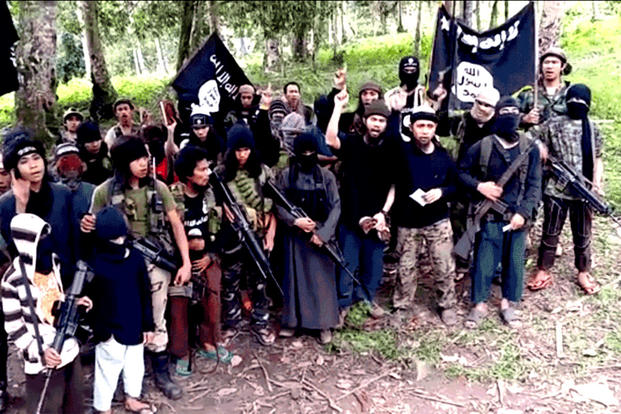Amid ongoing threats from an increasingly capable North Korea and power-hungry China, the Pacific is contending with a new growing menace: the presence of ISIS affiliates and other Islamic extremist groups looking to claim new territory.
In an address to the Japan-U.S. Military Statesmen Forum in Washington, D.C., the head of U.S. Pacific Command, Navy Adm. Harry Harris, said recent events -- including the violent takeover of the Filipino city of Marawi by the ISIS-linked Maute Islamist group -- illustrate the capability and reach of the ideology.
"These terrorists are using combat tactics that we've seen in the Middle East ... it's the first time ISIS-inspired forces have banded together to fight on this kind of scale in this region," he said.
Related content:
- US Special Forces Assist in Ending Siege in Philippines
- ISIS Claims Deadly Attack on US-Backed Syrian Forces
- Airmen Fighting ISIS Talk Future Electronic Attack Aircraft EC-X
"So it's clear that foreign fighters are passing their ideology, resources and methods to local home-grown next-generation radicals," Harris said. "So Marawi should be a wake-up call and a rallying cry for every nation in the Indo-Asia Pacific region."
The emergence of ISIS-linked terror groups in the Pacific, he said, comes as coalition efforts under Operation Inherent Resolve continue to deny militants territory in the Middle East and North Africa, where many such groups originate.
"Radicalized, weaponized and displaced terrorists will inspire new fighters in the Indo-Asia Pacific," Harris said.
The terror takeover in Marawi happened just months after Isnilon Hapilon, a former leader of the Abu Sayyaf Islamist group, was named "Emir to all Islamic State Forces in the Philippines" by ISIS, he said. That was in April 2016. In May 2017, the Maute group launched its attack on Marawi.
"We were all reminded that ISIS is a truly global threat," Harris said.
Stopping the threat in the Pacific, he said, will require the actions of a coalition of nations. He noted that the United States this week delivered two Cessna 208B aircraft with intelligence, surveillance and reconnaissance capabilities to the Armed Forces of the Philippines (AFP) to assist in flushing out militants on the island of Mindanao and other islands within the Sulu Archipelago.
"The delivery of these brand-new aircraft is just the latest donation from the U.S. government which, over the last five years, has allocated nearly $300 million of grant money to provide the AFP with up-to-date equipment and training," Harris said.
He advocated continued regional cooperation and collaborative training between Japan, Australia, the United States and India to "keep the peace" and stop the spread of extremist ideology.
"Only through multilateral and multinational cooperation can we eradicate ISIS and other violent extremist organizations before they spread," Harris said.
-- Hope Hodge Seck can be reached at hope.seck@military.com. Follow her on Twitter at @HopeSeck.
Related Video:
Five Things You Don’t Know: ISIS





























